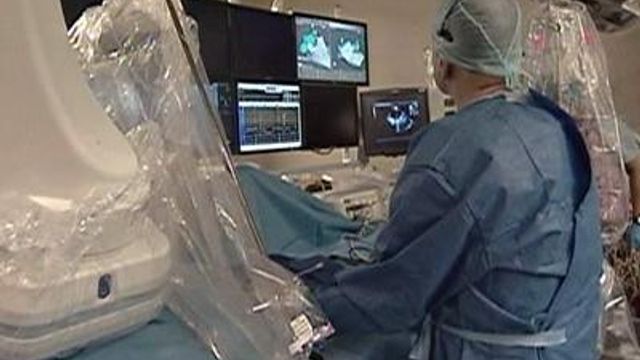Catheter procedure new way to treat arrhythmia
A catheter treatment is more effective than drug therapy in treating some patients with atrial fibrillation, according to new research.
Posted — UpdatedA catheter treatment is more effective than drug therapy in treating some patients with atrial fibrillation, according to new research.
Atrial fibrillation is a common heart rhythm problem that increases the risk of stroke, heart failure and even death. In a three-year study of 167 patients who had a form of intermittent atrial fibrillation, one group was treated with anti-arrhythmic drugs, while the others had catheter ablation.
The procedure involves inserting a catheter in a patient's blood vessel and guiding it up to his or her heart. Radio frequency energy is then applied to heat up the tissue near the catheter and destroy muscle tissue where abnormal heartbeats might cause an arrhythmia to start.
"The goal is to destroy the muscle around the pulmonary veins in order to prevent those transmissions of electrical impulses to the rest of the heart," said Dr. David Wilbur, a cardiologist at Loyola University Medical Center, in suburban Chicago.
Sixty to 70 percent of the catheter group never had another episode of arrhythmia. The results were so promising that researchers stopped the study early.
"In contrast, patients treated with drug therapy had somewhere between an 80 and 90 percent recurrence of arrhythmias over that time frame," Wilbur said.
Robin Drabant, who has had atrial fibrillation since she was a teen, underwent a catheter ablation two years ago.
"My heart would just start racing, and I would kind of lose my breath, and usually it only lasted for a couple of seconds, but as I got older, they got progressively worse and more frequent," Drabant said, recalling her episodes of arrhythmia.
She said the catheter procedure has changed her life.
"It was the best decision I've ever made because my quality of life is just so much more improved," she said. "I'm a normal 36-year-old and very glad I did it."
Copyright 2024 JAMA. All rights reserved.





